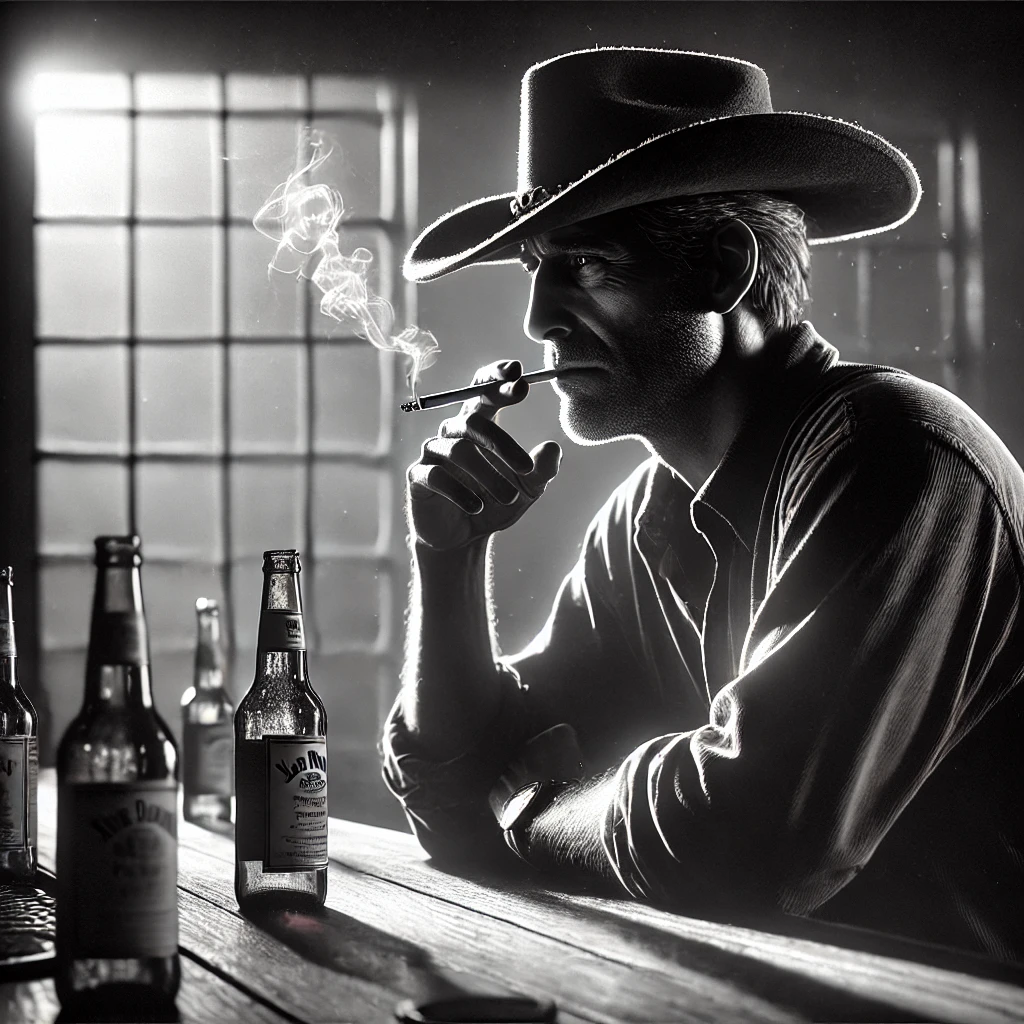
At Issue: When I wrote the blog post “Debunking Taylor Sheridan’s ‘Landman’” I had not watched the series. I was simply curious as to how Billy Bob Thornton was going to be the voice for the “unwoke.” He’s been doing this shit for a number of years when he acted like an arsehole on a CBC radio interview some years back. I had no issue with Taylor Sheridan himself. I remembered his character on that show Sons of Anarchy and marvelled at his rise to prominence creating a slew of bankable programs. When I finally watched his series Landman and looked at the critics rating on RottenTomatoes of 76%, now I get it. I struggled to watch this show before I had to turn it off. It’s awful.
What happens in a character-driven story is characters often freelance. Given the chance, characters feel compelled to explain what they are doing and why they are doing it. This fills time quite well but quickly becomes annoying. In Landman, there’s constant “mansplaining”—and not just from a feminist perspective, but from a narrative one too. Not surprisingly, Landman does not care much for nuance or feminism. Fair enough. I get it. The men are doing all of the explaining and the women are doing all of the listening, apologizing or displaying. I’m agnostic on the idea of “mansplaining” since I have seen it used as a way to stifle or interrupt debate also known as “tone policing.” Mansplaining in this context however is getting a bit much. It’s becoming annoying, lazy, and narcissistic where I have my hand on the proverbial trigger ready to kill this. All this chatter makes me wonder where is the “rugged individualism” that should define a Texas oil man with the hint that his profession will probably be disappearing due to modernity and Sheridan’s low-hanging-fruit fossil fuel denialism. Even in Ayn Rand’s stories, this type of rugged individualism is vividly portrayed. Howard Roark, for example, says very little. He’s understood through his actions and reactions much like we would experience watching old Western. Long-winded lectures explaining himself are absent. Instead, his deeds and offerings speak for him, while side characters will often fill in some of the clues as to what is happening.
This is not to suggest Landman isn’t entertaining. It is. The series is very well shot, with sharp lighting and tight direction. However, every action seems to require an explanation for why the characters are doing what they are doing. Why? It’s unnecessary. My imagination of a roughneck Texas oilman is sparse. All I have is “Jock Ewing” and Three Easy Pieces. Few words are spoken, and when they are, they are gospel. A rough, dog-eared Bible of old-world wisdom born from working a land that has been unforgiving and has even taken lives. Taylor Sheridan’s character development, aimed at eschewing the so-called “woke” world for a bygone one, rings hollow. In one instance, the teleplay explicitly explains that a roughneck worker has a wife, a large home, a new car, and a successful life, despite spending much of his life in prison. Why not start with that and shatter the mold, throwing the audience off balance? Instead, Sheridan insists on explaining it rather than showing it.
(As a side note, I travelled throughout the US in the early 90s. One of my stops was a small-town country-and-western bar in Montana. I stood there with my then-girlfriend drinking beer and chatting it up with three young local men. Young men who wore baseball caps, designer jeans and expensive high tops. We talked about all kinds of subjects and shared common interests. One man offered to teach my girlfriend real country-and-western dancing, which I thought was cool. The moment was shattered when a man walked into the bar wearing a cowboy hat and a duster coat. The three men dismissed him as a poser. They had the right to. Why? Because these guys were real cowboys. Their day jobs involved corralling livestock on working ranches preparing them for slaughter. None of them resembled Billy Bob Thornton or a Louis L’Amour character. They were regular people with real cowboy jobs that drove Hondas and Toyotas.)
Sheridan has missed a golden opportunity to depict the modern oil roughneck. Someone well-off, plugged into social media, with mixed political views, and more into new music than just country. Instead, Sheridan clings to the preservation of an old ideal and cheapens it with lazy, facile representations clearly designed to be anti-“woke.” It’s exhausting. This lack of imagination makes the series feel cheap.
Landman is cringey at times. Just as some recoil at “woke” elements, I react to this phony “masculine energy.” It’s self-righteous, insecure, and performative. The fist-pounding and bravado are projections from Jon Hamm, each one a confession of inadequacy or moral decay. The solution Sheridan offers is a glib, laissez-faire, weak-on-the-facts response, as if the characters believe they’re above it all. And don’t get me started on the female titillation in this production to meet the Maxim magazine crowd. But then again with Mark Zuckerberg’s glare onto Lauren Sánchez’s tits at Trump’s inaurgaruation maybe Sheridan is on to something. Or, Zuck’s view on “masculine energy” is just the boy who will never get the prom queen because despite his billions, he’s still an awkward loser. But not with Sheridan’s main character. Broke. Divorsed. Owning thousands but still has bons mots to redeem himself. Tedious.
Landman tries to follow a Western or Film Noir-style single-character-driven story, where the protagonist remains mysterious. The problem? Tommy never shuts up! Sheridan says he likes to avoid “exposition” like an allergy but then everything gets dumped into lengthy diatribes from the main character, who insists on telling us his entire life story—his politics, his drinking habits—whether or not anyone asks or cares. And yet, we still get expositional scenes from his wife, his son, and his boss. Why? Because the main character is so tedious we need a break from him. All this contradicts the approach of Sheridan’s own heroes like Cormac McCarthy or Louis L’Amour. Sheridan’s self-described “absurdly simple” plots (his words, not mine) aren’t just unsophisticated—they’re frustrating. Given the setting and historical backdrop, it’s just strong vs. weak guys. It’s pulpy Louis L’Amour material, which may not hold everyone’s interest, and even more so when the quiet lone wolf from the Film Noir or Western genre is a guy who just won’t shut the fuck up!
Taylor Sheridan and Louis L’Amour both focus on character-driven narratives, with straightforward, primal plotlines hinged on human conflict and survival in rugged, lawless environments. And Billy Bob exemplifies this with staring down a cop who is just doing his job and is saved by another cop who does his bidding. Their worlds are defined by ambiguous moral clarity and blurred justice, where the protagonist’s grit and personal code of honour drive the story. Sheridan’s admitted avoidance of “exposition” aligns with this style. Both writers favor action, dialogue, and the natural unfolding of conflict over intricate backstory or elaborate setups. However, I will say Sheridan’s writing is a polished evolution of pulp. His characters wrestle with existential questions, and his worlds are steeped in modern political and societal tension, such as land disputes in Yellowstone or borderland desperation in Sicario even though the female character is just a pawn and blithely dumb about the bigger picture. These layers elevate his work beyond pulp’s simplicity, but only cinematically. The writing does not match the cinematic display. It’s transactional and lacks a sense of beauty. You don’t feel for the sudden protagonist played by Benicio del Toro in Sicario who delivers the final blow. You feel for the neutered chick in the film who gets nothing after all of her exhaustive work. The pay off is terrible.
With Landman, Sheridan misses the mark. Less explanation and more trust in the audience to fill in the blanks would have served the series better. If the narrative is about an industry facing eventual death and the characters inhabiting that world, there’s no need to send a “message in a bottle” long before the inevitable demise. Let the story breathe and allow the audience to engage their imagination.
Sheridan did not learn from a great Texas story in the TV series Friday Night Lights. This was a series that hit the mark in modern day Texas. The pathos. The frailty and strength of the characters. The slogan the players had to repeat, “Clear eyes, full hearts, can’t lose”, was constantly challenged by the events that surrounded them. With Landman, there is no slogan but “I am man” in case you did not notice. The story is very intereting. The dialogue just gets in the way of a story that could sit well with many but is simply reduced at the level to meet the Trumpian social reset that is taking place, presently.

Leave a Reply